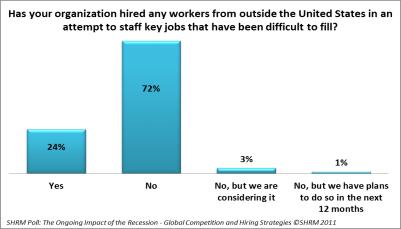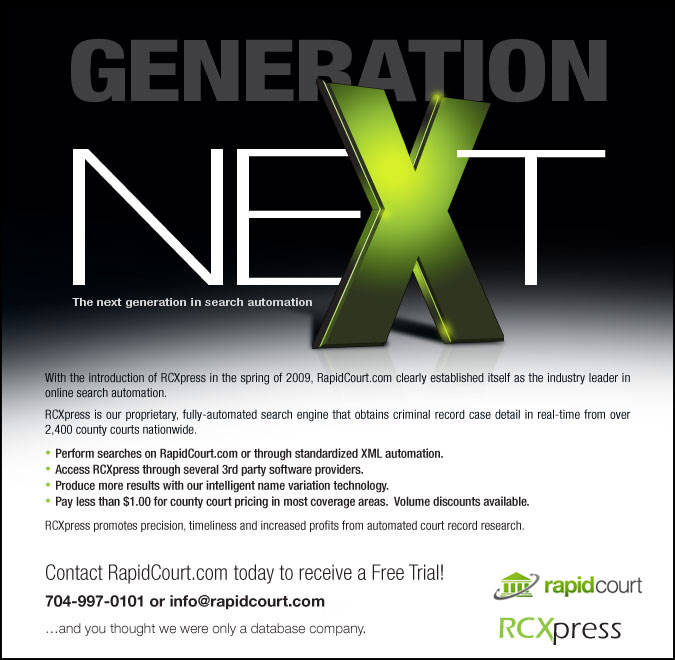| BACKGROUND
SCREENING NEWS |
EEOC
Cautions Employers On Using Social Media In Hiring Decisions
Employers
need to set guidelines for their HR staff on the use of social
media in the hiring process. The guidelines should make clear
that recruiters should not search online for information that
they could not seek on an application or in an interview, such
as race, age, religion, disability, union support, and any other
class or activity protected by law. Since online searches may
inevitably produce such information, guidelines and procedures
that exclude such information from the decision-making process
should be put in place. Employers may want to consider delaying
such screenings to the post-offer stage.
To read
more click here

Chart
of Credit Legislation Introduced in US States in 2011
To date,
58 bills in 28 states and the District of Columbia were introduced
or pending in the 2011 legislative session. The total number
of states that limit employers' use of credit information in
employment is now seven.
To read
more click here

Many in U.S. Are Arrested by Age 23, Study Finds
A new study
found that almost a third of Americans have been arrested for
a crime by age 23.The study, the first since the 1960s to examine
the arrest histories of a national sample of adolescents and
young adults over time, found that 30.2 percent of the 23-year-olds
who participated reported having been arrested for an offense
other than a minor traffic violation; nearly a 10 percent increase
from the 1965 study. Researchers say their results reflect growing
exposure to the criminal justice system in everyday life and
may be attributed to the justice system's increased aggression
in reach and zero-tolerance policies in schools during the last
50 years.
"This estimate provides a real sense that the proportion of
people who have criminal history records is sizable and perhaps
much larger than most people would expect," said Shawn Bushway,
a criminologist at the State University at Albany and a co-author
of the study. The researches hope their study can alert physicians
to signs that their young patients are at risk.
To read
more, click here

Sandusky
Denied Coaching Job in 2010 After Background Check
A year
and a half after an investigation began into Jerry Sandusky's
contact with young boys, the former Penn State assistant football
coach applied for a volunteer coaching job at a central Pennsylvania
college but was denied the job after a background check.Officials
at Juniata College said that Sandusky applied for the volunteer
football coaching job in May 2010 and was rejected the following
month after a background check showed a high school where Sandusky
previously volunteered was investigating him.Juniata spokesman,
John Wall, said the college was not informed of the details
of the investigation or the existence of a grand jury, but based
on the report, informed its coaches Sandusky was not to have
contact with the program."We basically did our due-diligence,"
Wall said.
Sandusky
is charged with 40 counts of child sex abuse involving eight
young boys. The information that Sandusky was still pursuing
coaching opportunities amid an investigation into his activities
comes as his attorney and prosecutors prepare for a preliminary
hearing where several of his alleged victims could testify.Sanduskyhas
denied being a pedophile and has vowed to fight the case.
To read
more, click here

Police Departments Are
Screening Tenants for Landlords
Concerns
are being raised by activists that some local Police Departments
in Alameda County and others across the country may be providing
video tapes / DVDs to landlords and property owners that contain
the images of the different types of renters, that the police
believe the landlords should not be renting to. According to
sources, some of the images being presented to landlords by
the police portray the mentally ill in a ridiculous and extremely
offensie manner, encouraging property owners to avoid renting
to the mentally ill and other renters being targeted by the
police for displacement from their local communities. Stay tuned
for more on this story, as more details become available.
As is, the police in Alameda County are working in partnership
with landlords and property owners in an effort to transform
neighborhoods into what are being called "crime free communities,"
and have targeted some renters for displacement, especially
those considered to be so-called "nuisance tenants" by the police,
the Neighborhood Crime Prevention Council (NCPC), and the Rental
Housing Association of Northern Alameda County (RHANAC). The
partnership between the police and property owners across the
nation are on-going, and the police are involved in many different
programs being implemented to run criminal background checks
on individuals, couples, workers, students, and families with
children that are seeking rental housing.
To read more click
here



$7 Million Awarded to Estate of Killed Driver in Truck Accident
Verdict
November
10, 2011 -- A Farmington, Missouri family received a $7 million
verdict in their trucking accident lawsuit against defendant
Dunaway Timber Company and its semi-truck driver, Morgan Quisenberry.
Roger Reagan was killed when Morgan Quisenberry's trailer went
across the center line (off-tracked) while taking a curve in
the roadway. Quisenberry's trailer clipped a Jeep Cherokee;
then Quisenberry's tractor crossed the center line and struck
a Kia head-on and veered directly into the cab of the semi-truck
Roger Reagan was driving.
The case,
tried in the Federal District Court for the Western District
of Arkansas primarily involved Quisenberry's qualifications
to drive a commercial vehicle and Dunaway Timber's failure to
appropriately screen its drivers, including Quisenberry. At
trial, Emison introduced evidence that Quisenberry had lied
on his application and had received two license revocations.
Despite these infractions, Emison showed that Dunaway Timber
Company could have easily discovered Quisenberry's previous
infractions and, if Dunaway had done so, Quisenberry never should
have been permitted to drive a tractor trailer. Jurors were
told that Dunaway Timber could have learned about Quisenberry's
license revocations with a simple background search that took
only 15 minutes and cost $15.
To read
more click here

Indiana's
Criminal Expungement Statute
Indiana
has passed a new criminal expungement law sometimes referred
to as the "Second Chance Law." The Second Chance Law allows
certain classes of individuals to petition a court for an order
significantly limiting most third parties' ability to access
the individuals' prior criminal records. It also allows those
duly convicted of a wide variety of crimes to restrict public
access to their criminal records eight years after they successfully
complete their sentence.For employers who conduct criminal background
checks as part of their application process, the Second Chance
Law significantly restricts their ability to discover applicants'
prior criminal conduct that may impact their suitability for
employment. However, the law does contain exceptions that prohibit
restricting access to records of crimes resulting in injury
to persons or those classified as a Class C or higher felony.
Indiana's
Second Chance Law clearly aims to prevent employers from considering
expunged/restricted criminal history information in hiring and
employment decisions on the notion that certain criminal offenses
should not function as barriers to employment. It imposes criminal
penalties on agency employees who fail to restrict criminal
records as required by the statute or who disclose criminal
records in violation of the statute. Therefore, employers confronted
with these circumstances should proceed with caution when making
hiring or other employment decisions based on criminal convictions
that are eight or more years old.
To read
more, click here

Be
Cautious of How Far Back You Are Looking Into An Applicant's
Civil or Criminal History
The U.S. Department of Justice has moved to intervene to defend
the constitutionality of the Fair Credit Reporting Act against
a consumer reporting agency accused of violating § 605
of the Act. A woman filed suit against General Information Services,
Inc. (GIS) when GIS performed a background check that included
details about an incident that occurred more than seven years
prior to the requested background check. According to the Act,
consumer reporting agencies cannot provide adverse information,
except for criminal convictions, "which antedates the report
by more than seven years."
GIS claims
that the seven-year limitation violates the First Amendment
of the United States Constitution, and that the Act's prohibition
is a "content- and speaker-based restriction on speech," noting
that the law does not prohibit employers from considering such
information but prohibits reporting agencies from providing
such information. The U.S. Government has thus intervened, taking
a contrary position to protect the constitutionality of the
Act's seven-year limitation.Employers must ensure that the consumer
reporting agency they use performs searches that are in compliance
with the Act in order to avoid being a co-defendant in a similar
suit.
To read
more, click here

 New California Requirements
for Disclosure/Authorization Forms New California Requirements
for Disclosure/Authorization Forms
New California
law regarding background screening go into effect January 1,
2012 and require revisions to employers' disclosure/authorization
forms.
Effective
January 1, 2012, there is an important amendment to California
Investigative Consumer Reporting Agencies Act (ICRAA), California
Senate Bill 909 (SB 909), requires that employers include
the background screening company's website address on the disclosure
form. This additional provision is designed to make information
available to an applicant about the background check company's
privacy practices, including whether a consumer's personal information
will be 'offshored' or sent outside the United States.
To read
more click
here

Fair
Credit Reporting Act Lawsuit Filed Against Capital One
On December
6, 2011, Nichols Kaster, PLLP, filed a lawsuit on behalf of
Plaintiff Kevin Smith in the United States District Court for
the District of Maryland, alleging Capital One illegally obtains
background checks in violation of the Fair Credit Reporting
Act ("the Act"). Plaintiff seeks to represent a class of all
Capital One employees and job applicants for the past three
years. The lawsuit accuses Capital One of violating the Act
by burying its background check authorization in a job application
including all sorts of extraneous information, and failing to
provide copies of the reports when it used them to take adverse
employment actions, such as refusing to hire an applicant. Employees
and prospective employees may be entitled to statutory damages
of between $100 and $1,000 for each violation.
Plaintiff's
attorney E. Michelle Drake explains, "Consumer Reports are notoriously
inaccurate. The Fair Credit Reporting Act exists in part to
ensure employees have a say in who can pull their consumer reports
and have an opportunity to contest any inaccuracies that they
may contain."
To read
more, click
here

| Welcome
to the U.S. Legal Challenge Question! |
Sponsored By:


As the background
screening industry continues to get more competitive the firms
that will ultimately succeed will be those that create competitive
advantage through their people by offering continuous learning
opportunities to heightened their knowledge and capabilities.
We believe that having employees that are very knowledgeable about
the legal landscape of background screening is essential to continued
success.
We are grateful
to John Fay, Vice President of Products and Services and General
Counsel at LawLogix, Inc
for providing the expertise for this valuable endeavor. In his
current role, John serves as, a leading provider of Electronic
I-9 Compliance, E-Verify and Immigration Case Management Software
and is responsible for overseeing product design and functionality
while ensuring compliance with rapidly changing immigration and
employment eligibility rules.
For information
regarding the answers to the Legal Challenge Questions, please
contact John Fay at(602) 357-4240and for more information about
LawLogix e-verify and immigration
support services please visit www.Lawlogix.com
Please choose
your answer by clicking on it:

GIS Lauded as One of Fastest Growing Companies in South Carolina
General Information
Services, Inc. (GIS), a leading provider of background screening
and talent acquisition solutions, has been recognized as one of
the 25 fastest growing companies in South Carolina.The recognition,
which comes from the South Carolina Chamber of Commerce, was one
of many in 2011. GIS was also recognized by the Chamber of Commerce
as one of the largest private companies in the state as part of
the South Carolina 100 and was recognized earlier in the year
by Inc. Magazine as one of the fastest growing private companies
in America.
While always
looking to better their product lines by introducing new services
and improving on others, GIS focuses on creating state-of-the-art
hiring tools that clients can access at no additional charge.
These tools help clients navigate hiring regulations both domestically
and internationally, simplify the process of ordering background
checks and ease the burden of new hire paperwork.
To read more, click
here

Sterling
Infosystems Becomes the Second Largest in the Industry
Sterling Infosystems Inc. announced it has acquired AISS, a leading
background screening company, from Acxiom Corporation (Nasdaq:
ACXM). William Greenblatt, Founder and CEO of New York City-headquartered
Sterling, said, "The acquisition of AISS, one of our largest competitors,
is a pivotal point in Sterling's history because it will make
us the second largest background screening company in the world.
It will furthermore allow AISS to realize its full potential by
being part of a company that is solely focused on what AISS is
focused on - background screening."
"Sterling
Infosystems and AISS are a natural fit for each other," said Acxiom
CEO and President Scott Howe. "This agreement will benefit both
companies - AISS will be able to grow and gain a global footprint
while Acxiom will have the ability to bring greater focus and
investment to our core database and marketing services business."
This acquisition
is the latest in a string of high-profile purchases Sterling has
made over the past few years.
To read more
click
here

ESR Assured Compliance Offers Employers Automated Compliance with
Employment Screening Laws Through Online Paperless AGR System
Employment
Screening Resources (ESR) has announced the development of
the
"ESR Assured ComplianceSM"
process that allows employers to automatically comply with
federal and state laws governing employment screening background
checks through the company's online paperless Applicant Generated
Report (AGR) system that is constantly updated with required changes
in hiring and employment regulations. For more information about
"ESR Assured ComplianceSM,"visit
http://www.esrcheck.com/ESR-Assured-Compliance.php .

Buoniconti
Foundation Dinner Honors Man of The Year In Their Continued Efforts
to Cure Paralysis
Davenport,
IA - December 13, 2011 - Michael Duffy, President of Per Mar Security
Services, was honored as the Man of the Year by the Chicago Chapter
of the Buoniconti Foundation at a dinner at Gibson's in Chicago,
Illinois. The Buoniconti Foundation was founded by NFL Hall of
Fame linebacker Nick Buoniconti and Barth Green, MD and provides
support to the Miami Project to Cure Paralysis. The Miami Project
is the world's most comprehensive spinal cord injury research
center, housed in the Lois Pope LIFE Center, a Center of Excellence
at the University of Miami Miller School of Medicine.
For more
information go to www.permarsecurity.com

Rick Kurland Named a 2011 “Smart100
CEO
Employment Background Investigations, Inc (EBI), recently announced
that President and CEO Richard (Rick) Kurland has been named a
2011 “Smart100 CEO” by Baltimore SmartCEO magazine.
In the Baltimore SmartCEO Smart100 list that was published earlier
this year, Mr. Kurland joins an elite group of local leaders.
This highly competitive Smart100 Program recognizes companies
and their CEOs who have demonstrated exceptional leadership, strategic
vision, and character, providing them with the opportunity to
help educate, motivate and inspire other decision-makers through
their involvement with the program and magazine.
Mr. Kurland was truly honored to be among such
an exclusive list of local leaders and recognized within the Smart
CEO program. Mr. Kurland added, “It gives me great pleasure
to share both my challenges and leadership success experiences
with other local business leaders. I’m inspired and driven
by the entire staff at EBI as they embrace my vision, passion
and leadership style. This cohesiveness is what continues to propel
our firm as a global industry leader.”
To read more click
here



Maintaining
Employee Privacy Across Jurisdictions
Companies
need to be aware of their obligations under the profusion of data
protection laws and regulations that govern the collection, use
and transfer of their employees' personal information. This is
especially crucial for companies that have operations subject
to the laws of multiple jurisdictions, as requirements vary widely
from country to country and even from state to state. As a rule,
only personally identifiable information (personal data) is afforded
special protection by data privacy laws and many, but not all
data privacy laws exempt personal data that has been encrypted.
It should also be noted that data privacy laws protect not only
active employees, but also information from clients and customers,
job applicants, consultants, independent contractors and terminated
or retired employees.
Although
U.S. law is trending toward stricter protection of personal data,
the laws in other countries are often much more extensive than
even the strictest U.S. standards. Employers should consider all
legal requirements, whether local, state or provincial or nationwide,
that may impact their data privacy policies and procedures. Failure
to comply with data protection laws can result in penalties such
as civil fines and sometimes, criminal prosecution.
To read more,
click
here

International
Biometrics Privacy Charter
The Biometrics
Institute launched its Biometrics Privacy Charter on November
30, 2011, during its 7th Biometrics Institute Technology Showcase
and Exhibition in Canberra, Australia. The Charter is now available
to all members.
"This Biometrics
Privacy Charter has been designed by the Biometrics Institute
to provide a universal guide for suppliers, end users, managers
and purchasers of biometric systems," says Isabelle Moeller, General
Manager of the Biometrics Institute, "it is the public's assurance
that the biometric managers have followed best practice privacy
principles when designing, implementing and managing biometric
based projects."
The Charter
is intended to be a guide across many different countries and
jurisdictions. It takes into account the legislative and administrative
frameworks of different countries but recognizes that biometrics
and information technologies do connect beyond national boundaries
and across different fields as diverse as health records, border
controls, consumer based applications in the telecommunications
industry, banking, and drivers licenses.
To read more,
click
here

The
Importance of a Comprehensive Breach Response Strategy that Includes
Insurance
Roughly 10%
of companies in the United States purchase a comprehensive breach
response strategy despite the fact that everyone needs it. Comprehensive
coverage goes hand in hand with breach prevention, breach response
and cyber liability insurance. Breach prevention includes hardware,
software and corporate culture, and the quality of these components
can greatly vary. An estimated 60 to 65 percent of breaches are
caused by something internally, making underwriting a cyber liability
policy difficult. Understanding a company's breach prevention
strategy and their existing environment is the first step to building
a comprehensive breach strategy, while securing a cyber liability
insurance policy that fits into their breach response plan is
the last step.
The cyber
liability insurance market offers a variety of policies ranging
from limited to complete control in the breach response process.
Oftentimes insurance companies and brokers try to take many decisions
out of the insured's hands, so it important for companies to find
an insurance vendor who offers a policy that fits their specific
needs, without giving away too much control.
To read more,
click here

The
Conference Board Employment Trends Index (ETI) Increased Again
in November
The Conference
Board Employment Trends Index (ETI) increased in November to 103.7,
up from the revised figure of 102.42 in October. The November
figure is up 6.4 percent from the same month a year ago.
Says Gad
Levanon, Director of Macroeconomic Research at The Conference
Board: "The Employment Trends Index posted a large increase for
the second straight month, with all of its components showing
gains over these two months. The better than expected growth in
economic activity in recent months is likely to lead to some acceleration
in job growth in the beginning of 2012. However, this improvement
may be short lived, in particular as the U.S.
economy slows down once again in the coming quarters."
To read more
click here



| EMPLOYMENT
OUTLOOK (continued) |
The
Ongoing Impact of the Recession - Overall Financial Health and
Hiring SHRM Poll
Of the 73%
of organizations that were currently hiring full-time staff, the
majority (58%) were generally hiring direct replacements of jobs
lost since the recession began. Nearly one-third (30%) of these
organizations were hiring for completely new positions, while
12% reported they were typically adding new duties to jobs lost
since the recession began. This is part two of a series of SHRM
Poll findings on how the economic recession is impacting employers
in the U.S.
Click here for more information on the poll and to view slide
presentation.

U.S.
Worker Use of Prescription Opiates Climbing, Shows Quest Diagnostics
Drug Testing Index™
September
16, 2010 — More American workers and job applicants are
testing positive for prescription opiates, according to U.S. general
workforce data in the 2009 annual Drug Testing Index™ (DTI)
by Quest Diagnostics Inc. Results from more than 5.5 million urine
drug tests reveal an 18 percent jump in opiate positives in the
general U.S. workforce in a single year (2008 to 2009), and a
more than 40 percent climb from 2005 to 2009.
To read more click
here

STOP
STRUGGLING WITH WRITING AND PUBLISHING YOUR NEWSLETTER: |

We can help
you have a high quality e-newsletter to help nurture your relationship
with your clients and attract new clients. Our customized newsletter
service will take over your newsletter task or create a new one
for you. We can manage the creation of your newsletter for you.
We are constantly
researching information to use for The Background Buzz and
you can put our research to use for you. Using the information
rich content from The Background Buzz (minus the ads
and competitors information) we will create a custom newsletter
for you.
Use your staff’s
time to do more valuable work and save all the hassle of researching
or writing articles, formatting and managing all the other ezine
tasks with our customized ezine process.
Contact Barry
Nixon at 949-770-5264 or at wbnixon@aol.com
for more information.

| THE
WASHINGTON REPORT BY MONTSERRAT MILLER |
 Montserrat
Miller is a Partner with the law firm Arnall Golden Gregory, LLP
and is based in Washington, DC. Ms. Miller's practice focuses
on privacy and immigration compliance, as well as representation
before Congress and federal regulatory agencies such as the Federal
Trade Commission, Equal Employment Opportunity Commission, Consumer
Financial Protection Bureau and the Department of Homeland Security. Montserrat
Miller is a Partner with the law firm Arnall Golden Gregory, LLP
and is based in Washington, DC. Ms. Miller's practice focuses
on privacy and immigration compliance, as well as representation
before Congress and federal regulatory agencies such as the Federal
Trade Commission, Equal Employment Opportunity Commission, Consumer
Financial Protection Bureau and the Department of Homeland Security.
You can contact
Monterrat at Montserrat.Miller@AGG.com
or visit http://www.agg.com/Contents/Home.aspx
The
Richard Netter Conference - Conference on Criminal Records and
Employment
I recently
spoke at the Conference on Criminal Records and Employment, hosted
by Cornell University's ILR Labor and Employment Law Program in
New York City. The
program agenda included a series of panels discussing how
criminal records are reported in consumer reports, how consumer
reporting agencies ("CRAs") operate, EEO law, what employers need
to know when using criminal records, negligent hiring suits, re-entry
issues, ban the box and others topics.
My panel,
entitled "What Are the Issues of Uniformity/Inaccuracy in the
Reporting of Criminal Records? How do Consumer Reporting Agencies
(CRAs) Operate?" was a good opportunity to talk about how CRAs
operate pursuant to the Fair Credit Reporting Act ("FCRA") and
to shed more light on the role of CRAs, including during the dispute
process. It was also a good opportunity to hear about concerns
that local legal advocates assisting those with criminal records
as they seek employment have with consumer reports generated by
CRAs. Fellow panelist Sharon Dietrich from Community Legal Services
discussed her concerns about inadequate matching criteria, reporting
obsolete non-convictions, reporting of expunged cases, duplicative
entries of the same case, confusing and prejudicial formatting
and dispute processes that are difficult to use.
To read the
full report click
here



| RECRUITING
AND TALENT ACQUISITION |
More
Organizations Have Difficulty Filling Positions
According
to a recent study from the
Society for Human Resource Management , recruiters are having
difficulty finding candidates to fill specific jobs - 52% of survey
respondents report difficulty recruiting for specific jobs in
their organization. To fill these positions, some organizations
are beginning to hire from outside the U.S. But most are not,
suggesting they're looking locally and domestically for the help
they need. Those that have hired from outside the U.S. tend to
be larger organizations - they are more likely than smaller organizations
to have hired workers from outside the U.S. - yet only 23% of
organizations believe they are facing global competition for qualified
applicants for jobs they are having difficulty filling. However,
with 26% of responding organizations including multinational business
units it is no wonder the survey finds 24% have hired workers
from outside the U.S.

To read more
click
here

Public
Record Update
Sponsored by:

Public
Record Update
By Mike Sankey, brbpulications.com
|
California Birth and Death Certificates
|
|
California Birth and Death Certificates
Effective January 1, 2012, the fee for a certified copy
of a birth, death, or fetal death certificate increases
by $2.00 per record. This increase will take place at
the California Department of Heath (CADH) and also at
the county level. The fees at various county clerk and
recorder's offices vary and do not necessarily have the
same fee structure as the CADH.
The
fee increase is part of Assembly Bill 1053 signed by the
governor. The legislation also provides for two additional
$2.00 increases to take place January 1, 2013 and January
1, 2014. View AB-1053 at www.leginfo.ca.gov/bilinfo.html
|
| Motor
Vehicle Record News |
|
Arkansas
As
of December, 2011. Arkansas Drivers may now request, view
and print their own record online at https://www.ark.org/personal_tvr/index.php
. The name, DOB, DL, the DL issue date, and last
five digits of the SSN are required along with a major
credit card. The fee is $8.50 for an insurance record
or $11.50 for a commercial record.
Another
new development in Arkansas is the CDL Medical
Certificate data will now displayed on commercial
records. For more information about this certificate,
visit www.dfa.arkansas.gov/offices/driverServices/Pages/medCert.aspx
Oregon
The
Oregon Department of Administrative Services (DAS) recently
signed a contract with NIC to provide E-Government services
on behalf of Oregon state agencies. DAS has an agreement
with DMV for the exclusive rights to have NIC provide
access to electronic driving records through the new state
web portal once developed. This new service only involves
electronic driving records. Vehicle records are not part
of the arrangement, nor are any other DMV records offered
via electronic or hardcopy.
The
changeover to the NIC processing will mean an significant
increase in the cost of obtaining OR driving records.
No timetable or fee change announcement has been made
at this time. At present, the Oregon fee of $2.00 per
electronic driving record is well below the national average
of $8.39. The new fee is expected to be close to the national
average.
Wyoming
The
fee for an electronic driving record in Wyoming will increase
from $3.00 to $5.00 effective January 1, 2012. The fee
for a manually processed record remains the same at $5.00.
To
read more click
here

|
In
Search of Fraudulent Documents: Does the I-9 Process Really Require
Employers to be Enforcers?
Identity
theft and the use of fraudulent documents is a national problem
and in some instances it is a serious national security concern.
While the temptation of pulling out a black light to avoid accepting
a fraudulent document may exist, employers are not expected to
be "document experts" when it comes to reviewing identity and
work authorization documents for the I-9 process. Current I-9
policies only require employers to detect and report any obviously
fraudulent documents.
But for those documents that are not so obviously fraudulent,
the question of how far an employer should go before entering
liable territory remains.Many don't believe that employers should
be making hiring and firing decisions based on a process that
requires them to act more like a detective than an employer. In
fact, employers are more likely to be found liable for overstepping
their boundaries rather than the latter. Therefore, it is advised
that detailed document review should be left to the experts.
To read more, click here



Justice
Department Sues Teaching Hospital for Pattern or Practice of I-9
Document Abuse
Today, the
Department of Justice reminded us again that sometimes employers
can go too far in their I-9 obligations, crossing that difficult
(and often blurry) line between diligent review and discriminatory
practices. The DOJ's latest reminder came courtesy of a press
release, announcing the filing of a lawsuit by the DOJ's
Office
of Special Counsel for Immigration Related Unfair Employment Practices
(OSC) against the University of California, San Diego Medical
Center (UCSD Medical) for discrimination in the Form I-9 process.
According to the press release, the DOJ's independent investigation
revealed that the medical center engaged in a pattern or practice
of requesting excessive I-9 documentation from newly hired non-U.S.
citizens (such as permanent residents, nonimmigrant visa holders,
etc.) in order to verify or re-verify employment eligibility.
The complaint seeks a court order prohibiting future discrimination
by UCSD Medical, monetary damages for any individuals harmed by
those actions, and civil penalties.
To
read more click here

Apple
Foils National Security Threat By Killing Fake Driver's License
App
When Pennsylvania
Senator Bob Casey, sent a letter to Apple CEO Tim Cook last week
requesting that the app "Drivers License"
be removed from the App Store, the company quickly jumped
into action and the app was gone. Senator Robert P. Casey Jr.,
was convinced that the free iPhone app which allows users to create
fake driver's licenses for entertainment purposes, posed a threat
to public safety and national security. The high-risk app which
had comfortably resided in the App Store since October of 2009
"By downloading
'License', anyone with an iPhone or iPad can easily manufacture
a fake driver's license by taking a photo and inserting it into
one of fifty state driver's licenses' templates," Senator Casey,
wrote in his letter to Apple. "Users then have a high quality
image resembling an actual driver's license which they can easily
print, laminate, and use for any number of illegal and fraudulent
activities."
To read more
click here



Welcome
to the International Legal Challenge Question

Most industries
and firms now compete in a global marketplace which is continuing
to increase the need for background checks for new hires that
will reside in another country or that are being hired from another
country. Commensurate with this growth in background checks is
the need to understand the myriad of data protection, privacy,
human rights and local laws that govern the practice of conducting
background checks. To help background screening firms around the
world to further enhance their knowledge we have launched this
International Legal Challenge.
We are grateful
to Brian Arbetter a Partner with the global law firm of Baker
& McKenzie LLP for providing the question and answer to the
questions in the International Legal Challenge. Brian is based
out of the Firm's Chicago and San Diego offices. His practice
focuses on international law issues, with particular emphasis
on labor and employment, as well as workplace privacy. For information
regarding the answers to the International Legal Challenge questions,
please contact Brian at brian.arbetter@bakermckenzie.com.
Please
Choose One of the Following Answer in Response to the Question
For
information on sponsoring The International Legal Challenge Question
please Click
Here



Asia-Pacific
Economic Cooperation Leaders Endorse Cross-Border Privacy Rules
On November
13, 2011, Asia-Pacific Economic Cooperation ("APEC") leaders
endorsed the APEC Cross-Border Privacy Rules ("CBPRs") system
at an APEC meeting in Honolulu, Hawaii. The Leaders' Statement
also endorsed interoperability between national and regional privacy
and data protection regimes to facilitate moving data around the
globe while protecting privacy.
"Implementing
the APEC Privacy Framework through Cross Border Privacy Rules
enables greater information flows that support innovation and
promote interoperability across global data privacy regimes, while
enhancing data privacy practices; facilitating regulatory cooperation;
and enabling greater accountability through the use of common
principles, coordinated legal approaches, and accountability agents."
To read more
click here
Privacy
Commissioner's Tough New Approach To Information Leaks
In a speech
to the International Association of Privacy Professionals Australia/New
Zealand ( iappANZ), delivered on 30
November, the Australian Privacy Commissioner summarised the tough
new approach he will take to deal with companies that are careless
with customer or user data. Under the current law, the Commissioner's
determinations are enforceable in the Federal Court. The Australian
Privacy Commissioner outlined strict new tactics stating that
all businesses must have in place robust processes for the collection,
storage, use and disclosure of information. This includes rigorous
and ongoing training for all employees, the completion and retention
of compliance records, and firm strategies in relation to managing
contractual arrangements and, particularly, outsourcing provisions.
This is especially, though not exclusively, so for transborder
data flows and is particularly relevant for businesses considering
using cloud computing services. Businesses should also strive
to engender a culture of privacy awareness, confidentiality, data
protection and best practice in dealing with personal information.
To read more
click
here
Workplace
Fraud Cost $3.2B Last Year
Fraud in
the workplace cost Canadian small businesses $3.2 billion last
year, an accountancy group says. The report published Tuesday
by the Certified General Accountants Association of Canada (CGA)
found some 290,000 small and medium-sized enterprises were victimized
by some sort of occupational fraud last year.
The survey
of firms with less than 500 employees found that one in four,
or 26 per cent, of companies had been cheated by an employee.
The most common examples would be misappropriation of either company
assets and inventory, or straight cash.
To read more
click
here
Cayman
Islands Working Toward Data Protection Framework
The government
of the Cayman Islands is currently reviewing draft legislation
that, if passed, would institute a robust data protection framework.
The draft legislation comes four years after the Cayman Islands
enacted the Freedom of Information (FOI) Law and will soon be
available for public comment.The DPL "is modeled after the EU
Data Protection Directive (95/46/EC) and on the UK's Data Protection
Act 1998," says Deputy Information Commissioner Jan Liebaers.
"It is structured more concisely than its predecessors, with consecutive
parts dealing with principles, rights of data subjects, notification
responsibilities of data controllers, exemptions, functions of
the information commissioner and enforcement."
Additionally,
the proposal would place the DPL under the "auspices of the existing
freedom of information commissioner. "As deputy information commissioner,"
notes Liebaers, "I will likely play a central role in the planning
and implementation of the new law and in the enforcement once
it comes into effect."Liebaers says the driving force behind the
draft bill is to gain adequacy status from the European Commission.
Attaining adequacy, he says, would not only allow more fluid data
flows, but also "strengthen links between businesses in the Caymans
and the EU as well as multinationals which do business in the
Cayman Islands." Fluid, strengthened links would make it "easier
for EU businesses to outsource certain operations involving personal
data to the Cayman Islands."
To read more
click here
Details
of EU Data Protection Reform Reveal Dramatic Proposed Changes
EU privacy
law is under scrutiny and proposals for change are coming. Changes
are anticipated near the end of January. Some of the details of
those changes, however, have emerged. The EC circulated for comment
two proposed legal instruments that likely will form the baseline
of the EU's data protection framework for years to come.
The first
legal instrument is a draft General Data Protection Regulation,
which sets forth a general framework for EU data protection and
is intended to replace the 16-year-old Data Protection Directive
with a region-wide regulation. The fact that the instrument is
fashioned as a regulation is significant. Under EU law, regulations
have binding legal force as soon as they are passed, whereas directives
must be enacted into law by each individual EU Member State.
Besides the
Regulation, the second legal instrument released is a draft Police
and Criminal Justice Data Protection Directive. This directive
sets forth rules relating to cross-border transfer and other processing
of personal data for law enforcement purposes, with an eye toward
facilitating the sharing of this information between law enforcement
agencies while still complying with data protection law.
To read more
click here
Big
Changes Ahead for Companies Handling Personal Data
On 8 July
2011, the Government of the Hong Kong Special Administrative Region
published the Personal Data (Privacy) Amendment Bill 2011 (the
"Bill") in the Government Gazette. This marks
the beginning of the Bill's passage through the Legislative Council
("LegCo").
The Bill
amends the Personal Data (Privacy) Ordinance ("PDPO"),
which has remained unchanged since it came into force in 1996.
It addresses key areas that have been the subject of recent high
profile investigations, such as the Octopus case last summer,
which brought the use of personal data in direct marketing into
the spotlight.
The Bill
introduces a number of new offences with heavy penalties at a
level previously unseen under the PDPO - the highest being HK$1
million plus 5 years imprisonment for both sale and disclosure
of personal data without consent. This represents a significant
increase from the current penalties which peak at HK$10,000 and
2 years imprisonment.
To read more
click here
Final Version of Data Protection Law In Effect Today
Mexico has released the final version of its Regulations of the
Federal Law for the Protection of Personal Data Held by Private
Parties, which includes minor changes to the prior draft, reports
Hunton& Williams' Privacy and Information Security Law
Blog. The final version includes "clarification of notice
and consent requirements, changes to restrictions on cloud computing,
updates to requirements regarding data transfers and clarifications
regarding data subjects' rights," according to the report.
Source: http://www.huntonprivacyblog.com/2011/12/articles/mexico-issues-new-privacy-regulations-effective-december-22-2011/
Data
Bill Offers Companies Opportunities
The purpose
of the legislation is to safeguard personal information by regulating
the manner in which it may be processed, retained and destroyed.
It is a replica of the European Union's (EU's) data protection
directive. The bill is set to come into force within a couple
of months.
DaniellaKafouris,
senior manager of risk advisory at Deloittesays compliance is
good for SA as it will facilitate international trade. "We are
taking the next step (with the act) to align ourselves with our
international counterparts." Countries that have the legislation
are reluctant to trade with those that do not have it. The bill
is expected to come into force in the first quarter of next year.
Legal experts who have assessed the amount of work that needs
to be done say companies should not underestimate what is needed
to achieve compliance. The processing and safeguarding of personal
information cover the life cycle of the information. Therefore,
the compliance period is quite lengthy, says MsKafouris.
MsKafouris
says companies should look at the principles of the act, and see
it as an opportunity to begin a fresh relationship with their
clients, allowing them to update their data and to engage in data
cleansing.
To read more
click
here
Ground
Breaking Modification of the Spanish Laws
A decision
by the Court of Justice of the European Union (ECJ) introduces
an important change to the Spanish data protection framework.
In the past, companies had to rely on data subjects' consent as
the way of carrying out the majority of the data processing in
Spain because they did not recognize the "legitimate interest"
justification for the processing of personal data.
The ECJ concluded that the "legitimate interest" justification
for the processing of personal data as set forth in the Data Protection
Directive also should be available in Spain. However, the Spanish
Data Protection Agency (SDPA) stated that companies may not carry
out the processing of data exclusively based on their "legitimate
interest," but will be required to balance both their "legitimate
interest" and fundamental rights and freedoms of the data subjects
involved in the data processing.
To read more,
click here
The
United Kingdom Could Get A
Privacy Commissioner
The United
Kingdom could get a dedicated Privacy Commissioner, according
to a tabled discussion in the House of Lords. We learned of the
tabled amendment via Privacy International, which pointed followers
towards the document on Twitter and told the INQUIRER that such
a change is needed in the UK, due to what is a poor data protection
situation for UK citizens.
To read more
click
here

Police
Not Checking Backgrounds of Foreign Criminals, Report Warns
An official
review found that UK police are only conducting background checks
on one in seven foreign criminals, while tens of thousands are
slipping through the cracks. In the courts last year alone, some
35,000 EU citizens were convicted but previous foreign offences
were only sought from the Central Authority for the Exchange of
Criminal Records (UKCA) in 5,500 cases, meaning that judges did
not know the full offending history of criminals when passing
a sentence in the majority of the cases.
The report
brought light to the serious issue of foreign criminals working
in sensitive positions or with children without their employers
knowing their true past. Funding cuts to the UKCA could make the
problem worse and pose a "potentially huge" risk to the public,
since the report revealed that more than one million crimesare
not on the Police National Computer because forces are refusing
to pay a fee to obtain the criminal history of offenders. It is
recommended that potential employers should be allowed to request
a foreign background check if the applicant agreed, and that more
work should be done to include fingerprints along with previous
convictions to stop offenders turning up in the UK claiming to
be someone else.
To read more,
click here

The British Standards Institute (BSI) Has Launched A Standard
To Help Organisations Show They Have Robust Anti-Bribery Policies,
Practices And Systems In Place
BS 10500
- Specification for an anti-bribery management system responds
to a growing requirement and interest in an anti-bribery standard.
Interest in the UK has increased in particular as a result of
the UK Bribery Act which came into force in July 2011 and introduces
a new offence of "failure of a commercial organization to prevent
bribery". Compliance with the new British Standard, BS 10500,
will help companies prove to both internal and external stakeholders
that appropriate procedures are in place to prevent bribery.
To read more
click here

| INTERNATIONAL:
PROFESSIONAL WORKSHOPS AND ASSOCATION CONFERENCES
|
(
Click Here to View full list of 2011 International Events
) - Updated Monthly

|
ADVERTISERS IN THIS EDITION |


|  |
|
|
| |
|
Background
Screening Jobs |
|
Visit
the Job Board for the Employment and Tenant Screening Industry.
Here you will find resumes of people with industry experience
and employers seeking applicants with experience in Employment
and Tenant Screening and related businesses.
www.backgroundscreeningjobs.com

|
UPCOMING CONFERENCES, COURSES & EVENTS |
2011
Events (
Click Here to View full list of 2011 Events
) - Updated Monthly
SHRM
State Conferences, visit
http://www.shrm.org/Conferences/StateAffilliateConferences/Pages/default.aspx
Drug
and Alcohol Testing Industry Association (DATIA), 2011 Training
Course Schedule, visit
http://datia.org
SAPAA
Training Institute Learning Events, http://www.sapaa.com/
CUPA-HR
Conferences: http://www.cupahr.org/conferences/regconf.asp
World
Federation of People Management Associations, Events,
http://www.wfpma.com/events
|
 M'bolani!
M'bolani!
 We are pleased to report that the
initial sales for the 2012 Annual Background Screening
Industry Buyers Guide are off to a good start. The Buyers
Guide is now officially open for all of our Platinum Members to
participate in. The Buyers Guide will initially be directly distributed
to 10, 000 Human Resource Managers in June and distributed at
the SHRM Annual Conference in Atlanta. We will also distribute
at several other major Human Resource trade shows, post an electronic
copy to our web site for downloading and continue to distribute
through out the year. With only our Platinum Members included
its an exceptional and exclusive opportunity to feature your firm
in a format where your firm will be highly visible.
We are pleased to report that the
initial sales for the 2012 Annual Background Screening
Industry Buyers Guide are off to a good start. The Buyers
Guide is now officially open for all of our Platinum Members to
participate in. The Buyers Guide will initially be directly distributed
to 10, 000 Human Resource Managers in June and distributed at
the SHRM Annual Conference in Atlanta. We will also distribute
at several other major Human Resource trade shows, post an electronic
copy to our web site for downloading and continue to distribute
through out the year. With only our Platinum Members included
its an exceptional and exclusive opportunity to feature your firm
in a format where your firm will be highly visible.  To our readers that are suppliers
to the background screening industry this is a great time to take
advantage of a great opportunity to directly market your company
to your target audienceand
To our readers that are suppliers
to the background screening industry this is a great time to take
advantage of a great opportunity to directly market your company
to your target audienceand 


 New California Requirements
for Disclosure/Authorization Forms
New California Requirements
for Disclosure/Authorization Forms 




 Montserrat
Miller is a Partner with the law firm Arnall Golden Gregory, LLP
and is based in Washington, DC. Ms. Miller's practice focuses
on privacy and immigration compliance, as well as representation
before Congress and federal regulatory agencies such as the Federal
Trade Commission, Equal Employment Opportunity Commission, Consumer
Financial Protection Bureau and the Department of Homeland Security.
Montserrat
Miller is a Partner with the law firm Arnall Golden Gregory, LLP
and is based in Washington, DC. Ms. Miller's practice focuses
on privacy and immigration compliance, as well as representation
before Congress and federal regulatory agencies such as the Federal
Trade Commission, Equal Employment Opportunity Commission, Consumer
Financial Protection Bureau and the Department of Homeland Security.








